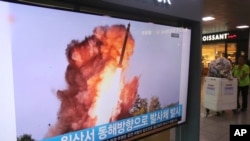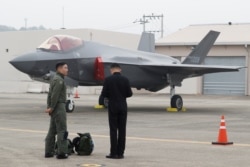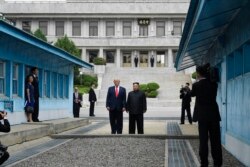North Korea has conducted another apparent missile launch, hours after announcing it will hold working-level nuclear talks with the United States on Saturday.
The North fired an unknown number of projectiles from the coastal town of Wonsan in Gangwon province early Wednesday, South Korea’s military said in a statement.
Japanese officials described the projectile as missiles, saying one landed in Japan’s exclusive economic zone off Shimane Prefecture. The other landed just outside Japan’s EEZ, Tokyo said.
If confirmed, it would be the first time in nearly two years that a North Korean rocket has landed in Japan’s exclusive economic zone.
No further details about the launch were immediately available.
Since May
It is North Korea’s 11th round of launches since May, suggesting Pyongyang intends to continue its provocations even while engaging in negotiations about its nuclear weapons program.
Late Tuesday, North Korea’s vice foreign minister said Pyongyang and Washington have agreed to hold long-delayed, working-level talks on October 5. The two sides will have “preliminary contact” the day before, she said.
It’s not clear how the latest launch will impact the talks. U.S. President Donald Trump has said he has “no problem” with Pyongyang’s previous launches, since they were short-range.
North Korea has given varying justifications for its previous launches this year. Some of the launches, it says, were aimed at sending a warning to South Korea. Others were simply a test of its military capabilities and should not be seen as a provocation, it insisted.
Kim Dong-yub, a North Korea expert at Kyungnam University's Institute for Far Eastern Studies in Seoul, said the latest launch likely has a dual message: to increase leverage ahead of working-level talks with the U.S., and to respond to South Korea’s unveiling Tuesday of advanced weaponry, including the F-35A stealth fighter acquired from the U.S.
North Korea has repeatedly criticized South Korea and the U.S. for continuing military exercises and Washington’s sale of advanced weapons to Seoul.
Delayed talks
The North’s announcement of talks came almost exactly three months after Trump and North Korean leader Kim Jong Un met at the demilitarized zone separating the two Koreas and agreed to resume working-level talks.
The talks have been stalled since February, when a Kim-Trump meeting in Vietnam broke down over how to pace sanctions relief with steps to dismantle North Korea’s nuclear program.
It’s not clear if either side has softened their negotiating stance, though recent developments suggest an increased willingness to work toward a deal.
Late last month, Trump said a “new method” to the nuclear talks would be “very good.” That is especially relevant since North Korean officials have for months said the only way for the talks to survive is if the U.S. adopts a "new method" or a "new way of calculation" or similar language.
Trump also recently dismissed his hawkish National Security Advisor John Bolton, who had disagreed with Trump’s outreach to North Korea.
North Korea praised both developments, even while criticizing the U.S. for what it sees as provocative actions, including the continuation of joint military exercises with South Korea and weapons sales to Seoul.
“It was only last Friday that North Korea indicated it would not resume talks unless Trump made a ‘wise choice,’ so between September 27 and today, the Trump administration likely sent Pyongyang a sign that the U.S. would be open to the phase-by-phase approach that North Korea has consistently called for this past year or so,” says Rachel Minyoung Lee, a Seoul-based analyst with NK News.
Approach
North Korea has repeatedly said it is not willing to unilaterally give up its nuclear weapons. Pyongyang instead prefers a phased approach, in which the U.S. takes simultaneous steps to relieve sanctions and provide security guarantees. Until now, most Trump White House officials have insisted they are not interested in a phased approach, and that North Korea must agree to completely abandon its nuclear weapons before receiving sanctions relief.
Kim and Trump have met three times since June 2018. At their first meeting in Singapore, the two men agreed to work toward the denuclearization of the Korean peninsula. But they never agreed on what that means or how to begin working toward it.
Trump has said he is open to holding another summit with Kim. But it has long been unclear how the talks can advance without more substantive discussions — including technical experts — about what each side is prepared to offer and how to get there.
“I hope this will at minimum reacquaint the substantive negotiators with their counterparts and perhaps lead to some actionable leads,” says Melissa Hanham, a weapons expert and deputy director at the Open Nuclear Network. “Any substantive working-level talks are good. Diplomacy is like a muscle and it needs exercise.”
South Korea’s presidential Blue House released a quick statement welcoming the talks, and expressing hope that they will soon result in a process that brings lasting peace and full denuclearization to the peninsula.






